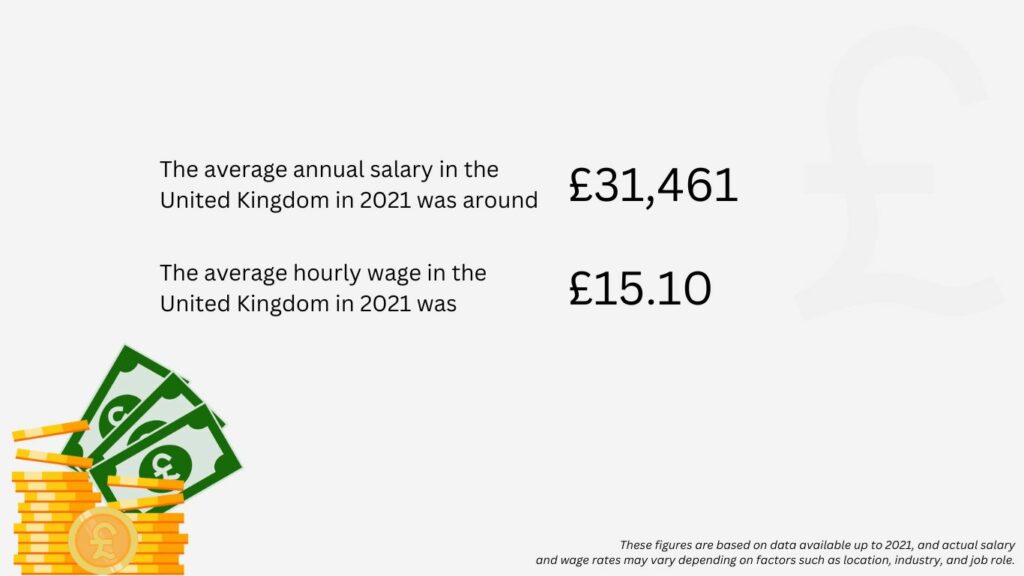The national average salary in the United Kingdom for the year 2021 was approximately £31,461, as reported by the Office for National Statistics (ONS). However, it’s important to note that defining what constitutes a “good” salary is not a one-size-fits-all approach and can depend on various factors including your location, age, and profession. This article aims to provide you with a general understanding of salary information to assist in making informed decisions about your career path and enhancing your job prospects.
Quick Link
- Factors That Determine a Good Salary in the UK
- What Constitutes a Good Salary?
- Average Salary in the United Kingdom
- Median Weekly Earnings in the United Kingdom by Age & Gender
- Median Salary in the United Kingdom by Education Level
- Average Salary in the United Kingdom by Industry
- Average Raise Percentage in the UK
- How to Land a High-Paying Job in the UK
When evaluating whether a salary is competitive or “good,” it’s essential to consider various factors specific to the United Kingdom job market and economic landscape. Here are some key elements that can influence what constitutes a desirable salary in the UK:
Factors That Determine a Good Salary in the UK
Education
Having a high school diploma or higher can open up more job opportunities. A degree from a reputable program in your field boosts your chances of getting noticed by top companies.
Experience Level
Experience matters. The more experience you have, the better your chances of earning higher pay. Entry-level jobs might pay less, but as you progress in your career, your income will likely increase.
Industry
Certain industries, like healthcare, engineering, finance, entertainment, legal, and IT, tend to offer higher salaries due to specialized skills. Choose a career in an industry that interests you and offers good earning potential.
Geographic Location
Salaries vary across the UK based on local job demand, cost of living, and tax rates. For example, London generally pays higher salaries due to its higher living costs compared to other regions like Manchester or Glasgow.
In summary, a good salary in the UK depends on your education, experience, chosen industry, and where you work. Consider these factors to make informed decisions about your career and income expectations.
What Constitutes a Good Salary?
Determining what qualifies as a good salary is subjective and can differ greatly from person to person. Several personal factors come into play, including your spending habits, financial goals, and any existing debts. The definition of a good salary also hinges on location, cost of living, and your chosen career.
Key Considerations:
Location: Where you live plays a significant role. The cost of living varies widely from place to place, impacting your salary needs. A good salary in a high-cost city may differ from that in a more affordable location.
Cost of Living: The overall cost of housing, groceries, transportation, and other essentials in your area can greatly influence what’s considered a suitable income.
Career Choice: Different careers offer varying salary ranges. What’s considered good in one field may not be the same in another.
To gauge the income required for comfortable living as a single person, you can use a cost of living calculator to compare income needs across different states or regions. Ultimately, your ideal salary should align with your financial objectives and the economic realities of where you reside.

Average Salary in the United Kingdom
As of the latest available data, the average salary in the United Kingdom can vary depending on various factors, but a general figure to consider is around £31,461. Please keep in mind that this figure is subject to change over time and may vary by location, industry, and occupation.
It’s important to note that salary figures can differ significantly based on where you live, your profession, and other factors. Additionally, pay disparities may exist based on gender and other demographic factors, although efforts are being made to reduce these gaps in the UK.
For the most up-to-date and precise salary information, it’s advisable to refer to the Office for National Statistics (ONS) or relevant industry sources.
Median Weekly Earnings in the United Kingdom by Age & Gender
Here’s an overview of median weekly earnings for women and men at various age groups in the United Kingdom, based on available data:
Women's Earnings (Weekly & Annual) | Men's Earnings (Weekly & Annual) |
Age 16 to 19: £502 (Approximately £26,104 annually) | Age 16 to 19: £538 (Approximately £27,976 annually) |
Age 20 to 24: £572 (Approximately £29,744 annually) | Age 20 to 24: £612 (Approximately £31,824 annually) |
Age 25 to 34: £703 (Approximately £36,556 annually) | Age 25 to 34: £758 (Approximately £39,416 annually) |
Age 35 to 44: £789 (Approximately £41,028 annually) | Age 35 to 44: £915 (Approximately £47,580 annually) |
Age 45 to 54: £769 (Approximately £40,028 annually) | Age 45 to 54: £949 (Approximately £49,348 annually) |
Age 55 to 64: £748 (Approximately £38,896 annually) | Age 55 to 64: £921 (Approximately £47,892 annually) |
| Age 65+: £838 (Approximately £43,616 annually) |
Median Salary in the United Kingdom by Education Level
In the United Kingdom, median salaries also vary based on education levels. Here are the approximate median annual salaries for individuals with different educational backgrounds:
- No formal qualifications: £16,200 annually
- Level 1 qualifications (e.g., GCSEs): £18,200 annually
- Level 2 qualifications (e.g., A-levels): £22,400 annually
- Level 3 qualifications (e.g., vocational diplomas): £25,300 annually
- Level 4 qualifications (e.g., bachelor’s degree): £31,400 annually
- Level 5 qualifications (e.g., master’s degree): £38,000 annually
- Level 6 qualifications (e.g., doctoral degree): £43,600 annually
Average Salary in the United Kingdom by Industry
Average salaries in the United Kingdom can vary significantly by industry. Here are approximate average annual salaries for various industries based on available data:
- Food preparation: £23,000
- Healthcare support: £26,000
- Personal care and service: £26,200
- Farming, fishing, and forestry: £27,000
- Construction and extraction: £43,600
- Education: £48,500
- Art, design, entertainment, sports, and media: £51,800
- Business and financial operations: £64,600
- Architecture and engineering: £71,200
- Computer and mathematical: £77,400
Average Raise Percentage in the UK
Pay raises in the UK vary, influenced by factors like job performance, cost of living, and company finances. From 2021 to 2022, typical pay increases ranged from 2% to 5%. Projections for 2023 suggest a similar range of 4% to 5%.
Consult industry reports or your employer’s policies for precise information on salary increases in your field or organization.
How to Land a High-Paying Job in the UK
Future-Proof Your Skills
In a rapidly changing job market, staying competitive requires keeping your skills up to date. Here are some steps to future-proof your career:
Stay Informed:
With the evolving landscape of artificial intelligence and technology, staying informed about industry trends is crucial. Focus on developing skills that will remain valuable in the future job market.
Explore High-Demand Fields:
Consider careers in high-demand fields like data science and information security, which often offer generous compensation. Investing in these skills can enhance your earning potential.
Seek Mentorship
Mentorship can be a valuable resource for career growth. Here’s how to make the most of it:
Find a Mentor:
Seek guidance from a mentor who can provide insights, resources, and motivation. Your mentor can help you navigate your career path effectively.
Leverage Employer Mentorship Programs:
If your workplace offers mentorship programs, take advantage of them to gain insights into growth opportunities within your company.
Become an Industry Expert
Becoming an expert in your field can set you apart in a competitive job market:
Invest in Knowledge:
Advance your knowledge through webinars, courses, or further education. Continuously enhancing your expertise can lead to career advancement and salary increases.
Network Effectively
Networking can open doors to high-paying opportunities. Here’s how to do it effectively:
Attend Networking Events:
Participate in industry networking events to stay updated on trends and expand your professional network. Be prepared to showcase your skills and make valuable connections.
Be Ready to Connect:
Carry your business cards or resume and be ready to pitch yourself effectively at these events. You never know when you might meet someone who can help you secure a high-paying career opportunity.
By following these strategies, you can increase your chances of landing a high-paying job in today’s competitive job market in the United Kingdom.
Frequently Asked Questions
1. What is the average UK salary in 2022?
The average UK salary in 2022 varies by industry, with fields like food preparation averaging around £23,000, while computer and mathematical careers can reach approximately £77,400.
2. How much is the average raise percentage in the UK?
The average raise percentage in the UK typically ranges from 2% to 5%. Projections suggest an average increase of about 4% to 5% in the future.
3. What are the strategies to secure a high-paying job in the UK?
To land a high-paying job in the UK, consider these five key strategies:
- Stay Informed: Keep up with industry trends and emerging technologies.
- Mentorship: Seek guidance from experienced mentors.
- Education: Invest in further education and expertise.
- Networking: Attend industry events to expand your network.
- Performance: Deliver outstanding job performance to increase your value.
By following these steps, you can enhance your chances of securing a high-paying job in the competitive UK job market.
4: How can I land a high-paying job in the UK?
To increase your chances of landing a high-paying job in the UK, consider the following strategies:
5: What factors can determine a good salary in the UK?
Several factors can influence what constitutes a good salary in the UK. These factors include education, experience level, industry, geographic location, and market demand. What is considered a good salary can vary widely based on these variables.


